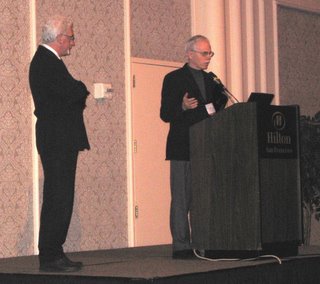Luk Van Wassenhove was the IFORS Distinguished Lecturer at this year’s INFORMS conference. Here he is receiving congratulations from Tom Magnanti (right), President of IFORS.

Luk spoke on “Closed Loop Supply Chains: Past, Present, and Future”. Closed-loop supply chains are those where the supply chain bringing goods from consumers back to suppliers is also important. Luk gave an interesting historical perspective on this rather young field. He suggested that the field has gone through 5 phases:
1) Technical remanufacturing. Research into how to best remanufacture/resuse returned items, with little regard to how they come back or where they go after remanufacturing.
2) Valuing reverse logistics. Research and interest in how items coming back to a supplier can create value for that supplier. These models are more market driven than just waste stream recovery, and address the front end acquisition of items.
3) Coordinating decisions, bringing the forward supply chain together with the reverse supply chain. Once the magnitude of the problem is realized, the reverse chain impacts the forward chain, and vice versa.
4) Closing the loop, with dynamic decisions over the lifecycle of products. One aspect of this is the need to spend money to make money. Consider a “recycled” computer: one that is only a few weeks old is much more valuable than one that is months old. In such a case, investments might need to be made to increase the speed of the reverse supply chain.
5) The final phase of research, which perhaps should have been the first one, is “Is there a market”? While this area has increased in academic stature, and there are visible, but isolated, examples in practice, how can these insights be embedded in real firms. This brings in issues of accounting (how should returns be valued) and marketing (how should cannibalism be handled between original and remanufactured products)?
This was an ideal plenary session: broad, understandable and interesting.

